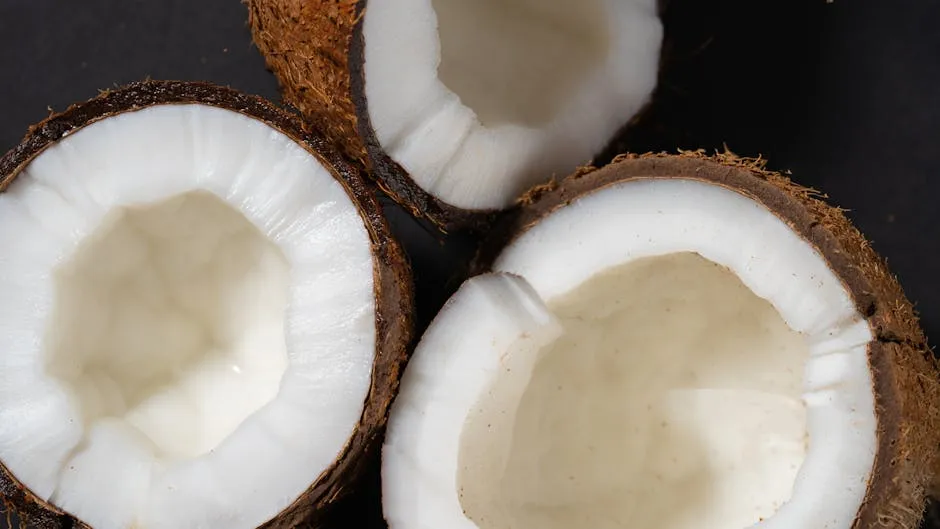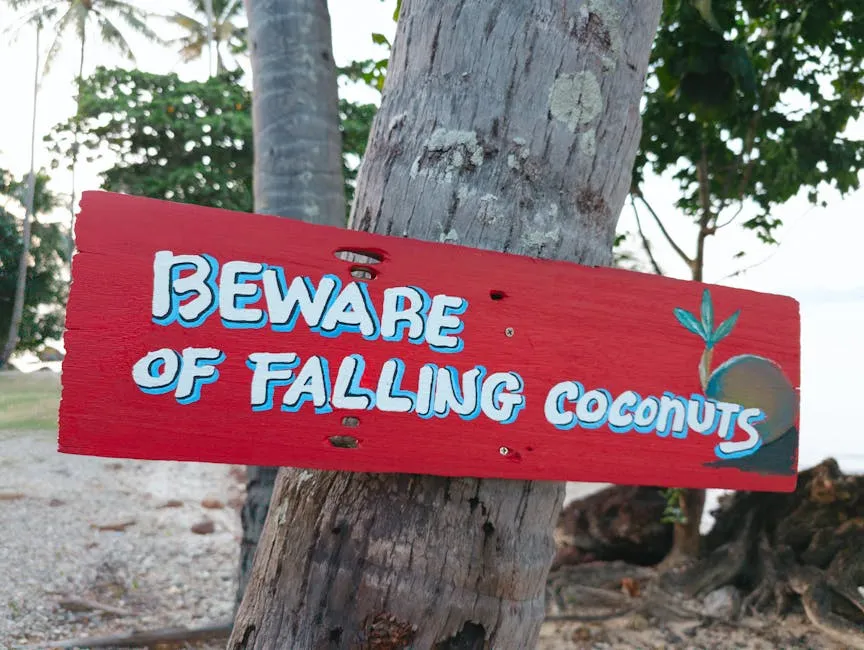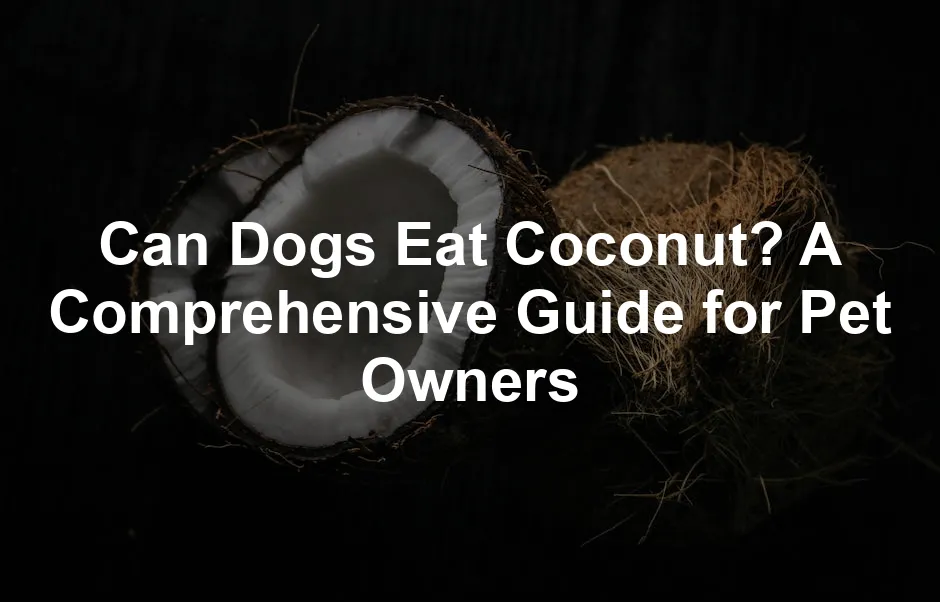Introduction
Coconut is a popular treat for many humans. But can dogs eat it too? With its growing presence in dog snacks, it’s essential to consider its safety for our furry friends. Always consult your veterinarian before adding new foods to your dog’s diet.
Speaking of tasty treats, have you checked out Coconut Treats for Dogs? They’re a great way to reward your pup with a tropical twist!
Summary and Overview
Coconut can be safe for dogs, but moderation is key. The coconut flesh, oil, milk, and water each offer different benefits and risks. Coconut flesh provides healthy fats and hydration. However, excessive amounts may lead to digestive issues. Coconut oil can improve your dog’s coat and skin but may also cause weight gain if overconsumed. Coconut milk should be unsweetened and given sparingly due to its high-fat content. Lastly, coconut water, while hydrating, can pose risks due to its potassium levels. Always consult a veterinarian for guidance.
If you’re looking to pamper your pooch, consider Coconut Scented Dog Shampoo. It’s the perfect way to give your pup a refreshing bath that smells like a tropical getaway!

Can Dogs Eat Coconut?
Overview of Coconut and Its Nutritional Value
Coconut is a drupe, not a nut, containing healthy fats, vitamins, and minerals. It’s rich in lauric acid, known for its anti-inflammatory properties. While coconut is generally safe for dogs, moderation is vital to avoid issues. Overconsumption can lead to gastrointestinal upset, such as diarrhea or bloating.
In small amounts, coconut can hydrate and provide energy. The meat contains fiber, which aids digestion. However, always introduce this treat gradually to monitor your dog’s reaction. Remember, every dog is unique, and what works for one may not work for another. Keeping coconut as an occasional treat ensures your dog’s diet remains balanced.
For those looking for a creative way to incorporate coconut into their dog’s diet, consider Coconut Oil for Dogs. It’s fantastic for their coat and skin, giving them that shiny, healthy look we all adore!

Types of Coconut Products Safe for Dogs
Coconut Flesh
Coconut flesh is safe for dogs in moderation. This tropical treat contains healthy fats, fiber, and vitamins. It can boost energy levels and support digestion. For small dogs, a few flakes are enough. Larger dogs can enjoy about a tablespoon. Always introduce it slowly to monitor for any stomach upset. Remember, moderation is key to ensuring your furry friend stays happy and healthy!
Coconut Oil
Coconut oil can provide several benefits for dogs, especially for their skin and coat. It helps keep their fur shiny and moisturized. However, too much coconut oil can lead to weight gain or pancreatitis. Start with small amounts, like a quarter teaspoon for small dogs and a tablespoon for larger breeds. Gradually increase as needed, but keep an eye on their weight and digestion. If any signs of upset stomach occur, reduce the amount. Always consult your vet before introducing new foods into your dog’s diet.
And for those who want to make their dog’s mealtime even more exciting, try adding Coconut Milk for Dogs (unsweetened). It’s a tasty way to keep them hydrated and healthy!

Coconut oil can be beneficial for dogs, but it’s important to be cautious about the amounts given. For more information, check out this article on pancreatitis in dogs.
Coconut Milk
Coconut milk can be a tasty addition to your dog’s meals. It contains healthy fats and may boost their immune system. However, choose unsweetened varieties to avoid added sugars. Too much coconut milk can cause gastrointestinal upset, so offer it in moderation. A teaspoon mixed into their food is a great starting point. Always watch for any signs of discomfort after feeding, so you can adjust accordingly.
And if you’re considering making some tasty treats, don’t forget to check out Organic Coconut Flour. It’s a fantastic gluten-free option for baking delicious dog treats!

Coconut Water
Coconut water is the clear liquid found inside young coconuts. It’s refreshing and packed with nutrients. This natural drink is a fantastic way to hydrate your dog. It contains electrolytes like potassium, which can help maintain proper hydration levels.
However, there’s a catch. High potassium levels can be risky for dogs. Too much potassium may lead to health issues, including heart problems. Always consult your veterinarian before offering coconut water to your furry friend. Moderation is essential to keep your dog happy and healthy!

For the active pet parents out there, Coconut Water Sports Drink (for pet owners) can be a great way to stay hydrated while you and your furry friend are out on an adventure!
Coconut water can be hydrating, but it is important to be aware of its potassium content. For more details, see this guide on dog diarrhea.
Dried Coconut
Dried coconut can be a safe option for dogs, but caution is necessary. Unsweetened varieties are fine, as they contain natural nutrients. Sweetened dried coconut, however, poses risks due to added sugars. These sugars can upset your dog’s stomach or lead to weight gain.
If you choose to give dried coconut, keep portions small. A few flakes should suffice. Always monitor your dog for any adverse reactions after introducing new treats.

If you’re looking for a fun chew toy that also incorporates coconut, check out the Coconut Shell Dog Chew Toy. It’s a great way to keep your pup entertained while being eco-friendly!
What Coconut Products Should Dogs Avoid?
Coconut Shells and Husk
Coconut shells and husks are not safe for dogs. They can pose serious choking hazards and lead to digestive issues. The hard texture can cause blockages if swallowed, leading to potential emergencies. Always remove the shell and husk before offering any coconut products to your dog. Prioritizing your pet’s safety is crucial!

Recommended Coconut Intake for Dogs
When feeding your dog coconut, consider their size. For extra-small dogs (2-20 lbs), limit to 1/8 teaspoon daily. Small dogs (21-30 lbs) can enjoy 1/2 teaspoon. Medium dogs (31-50 lbs) may have about 1 teaspoon, while larger dogs (51-90 lbs) can safely eat 1-1.5 teaspoons. Extra-large dogs (91+ lbs) can have 1-1.5 teaspoons as well.
Always remember the 10% rule for treats: treats should not exceed 10% of your dog’s daily calorie intake. This helps maintain a balanced diet while allowing your furry friend to enjoy coconut as an occasional treat.

How to Safely Feed Your Dog Coconut
Start by preparing coconut properly. Always remove the husk and shell, as these can cause choking or digestive blockages. You can offer fresh coconut meat, shredded coconut, or coconut oil. Introduce it slowly to your dog’s diet and monitor their reaction.
Watch for any digestive issues, such as diarrhea or bloating. If you notice any adverse reactions, stop feeding coconut and consult your veterinarian. Gradual introduction ensures your dog adjusts well to this new treat. Enjoy sharing this tropical delight with your canine companion!

And for a luxurious treat, consider a Coconut Fiber Dog Bed. It’s soft, supportive, and perfect for those afternoon naps!
FAQs
Can dogs eat coconut meat?
Yes, dogs can safely consume coconut meat. It’s best to offer small amounts, such as a few flakes for small dogs and about a tablespoon for larger breeds. Always monitor for any digestive issues after introducing it.
Is coconut oil safe for dogs?
Coconut oil is generally safe in small quantities. It can help with skin health and provide energy. However, excessive amounts may cause weight gain or pancreatitis. Consult your vet for proper serving sizes.
Can dogs have coconut milk?
Coconut milk is safe in moderation, preferably unsweetened. A teaspoon mixed into their food can be beneficial. Too much may lead to diarrhea, so introduce it gradually and watch for reactions.
What are the risks of giving dogs coconut?
While coconut is safe, overconsumption can cause gastrointestinal issues like diarrhea. Always keep portions small and consult your vet for guidance, especially if your dog has health concerns.
Can dogs drink coconut water?
Dogs can drink coconut water, but it should be offered in moderation. The high potassium content can be risky, so always check with your veterinarian before introducing it as a hydration option.
Please let us know what you think about our content by leaving a comment down below!
Thank you for reading till here 🙂
All images from Pexels





